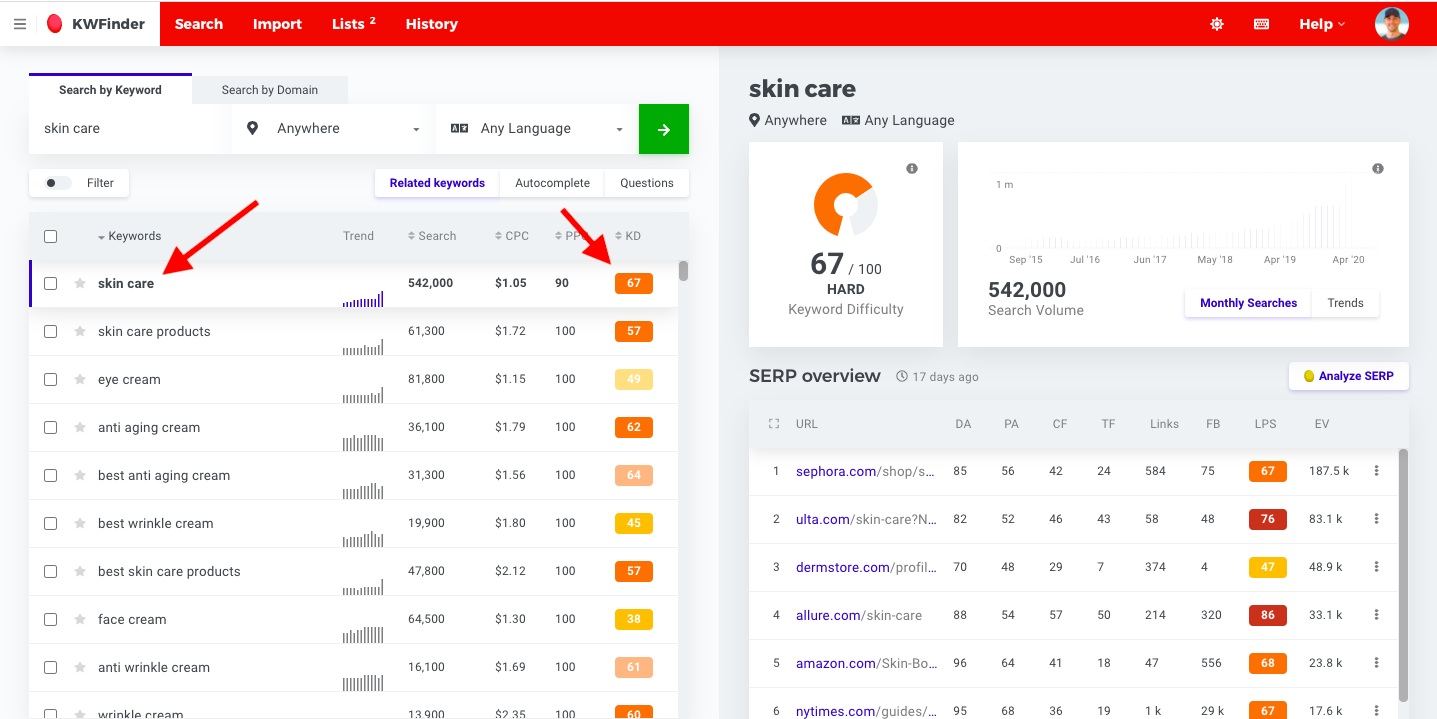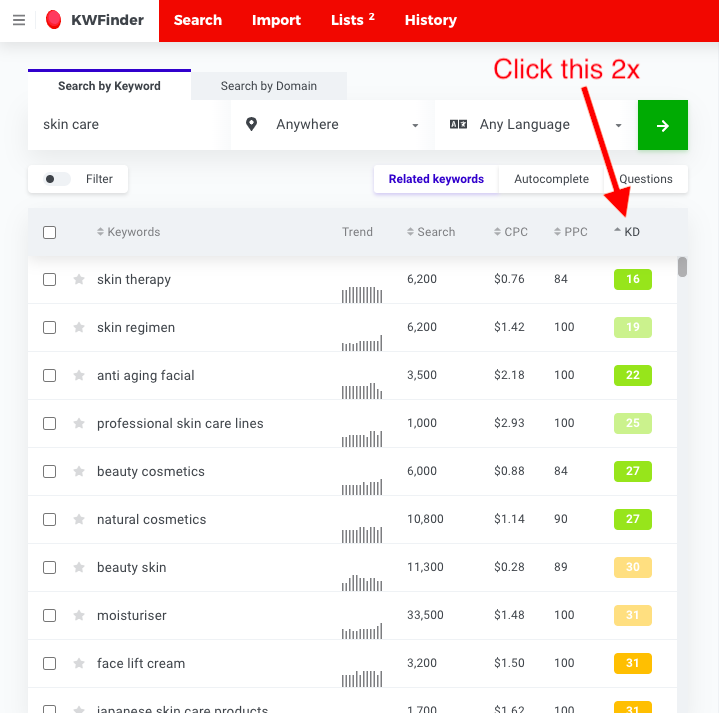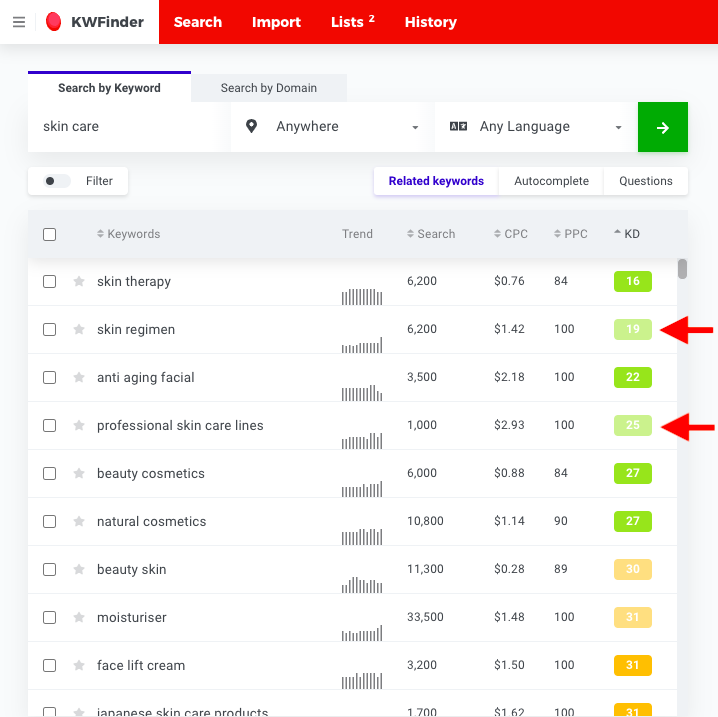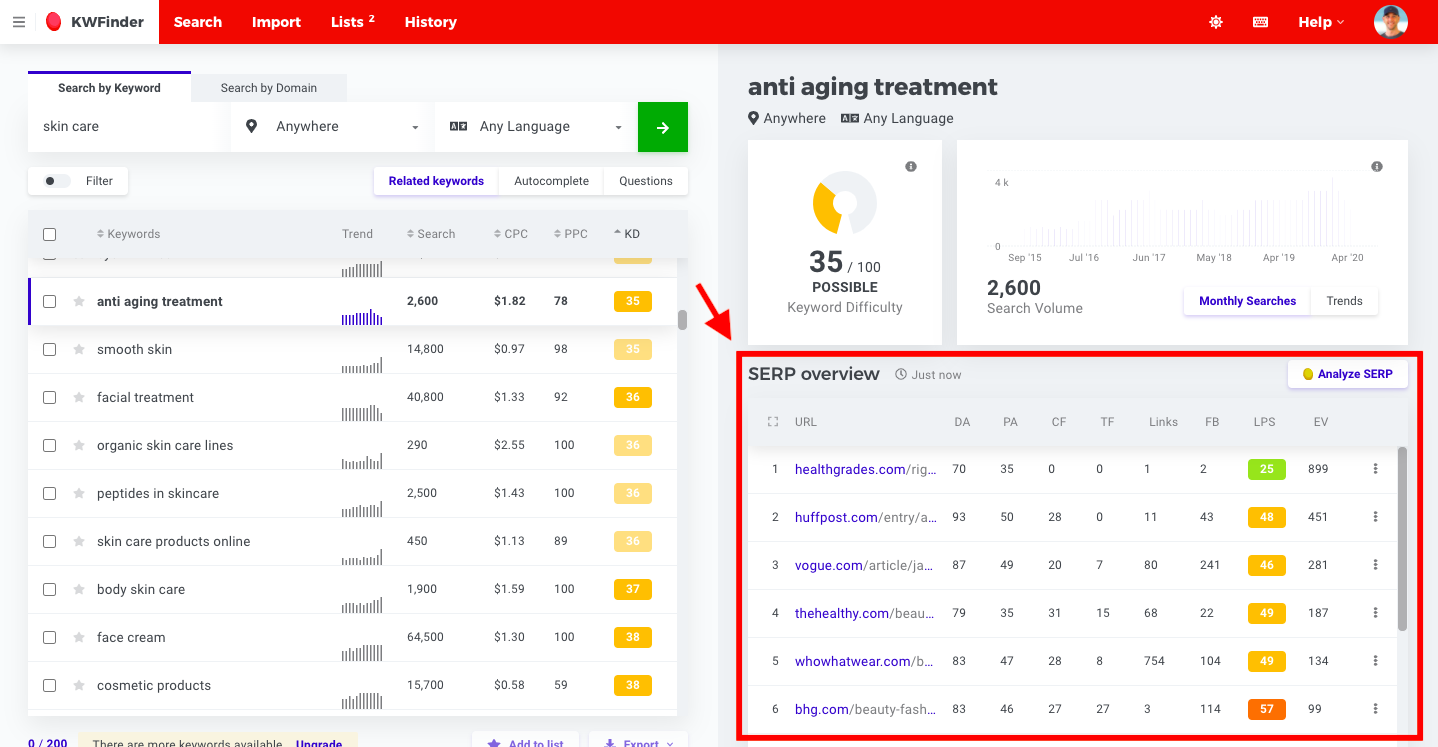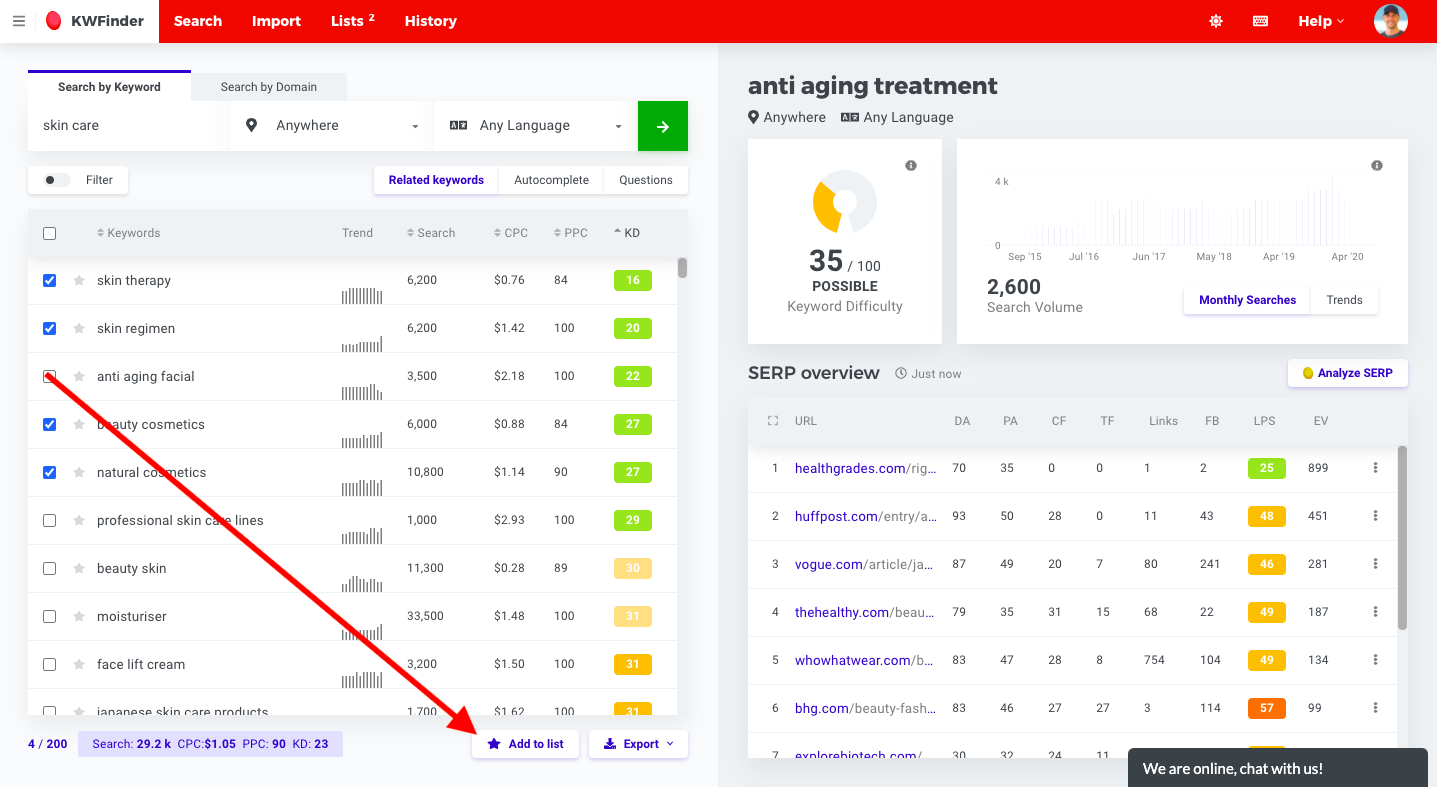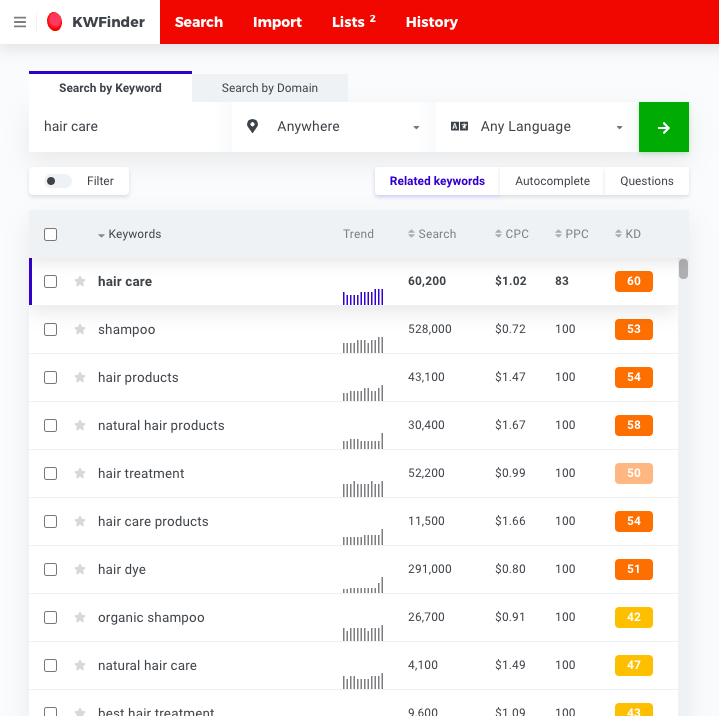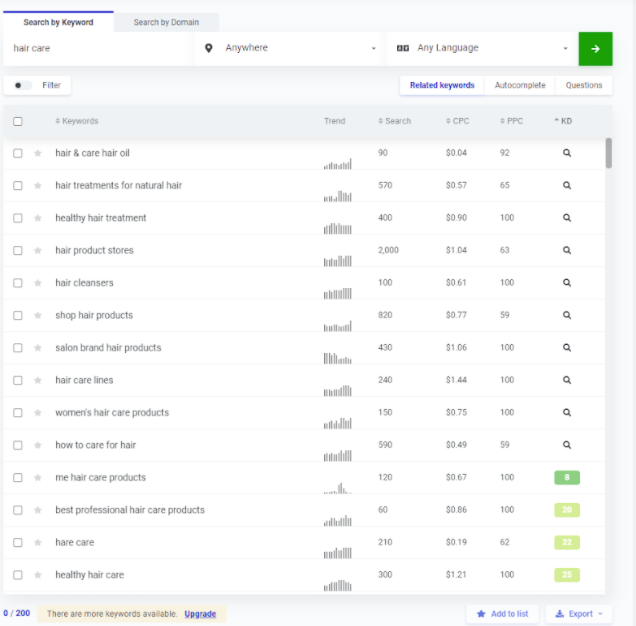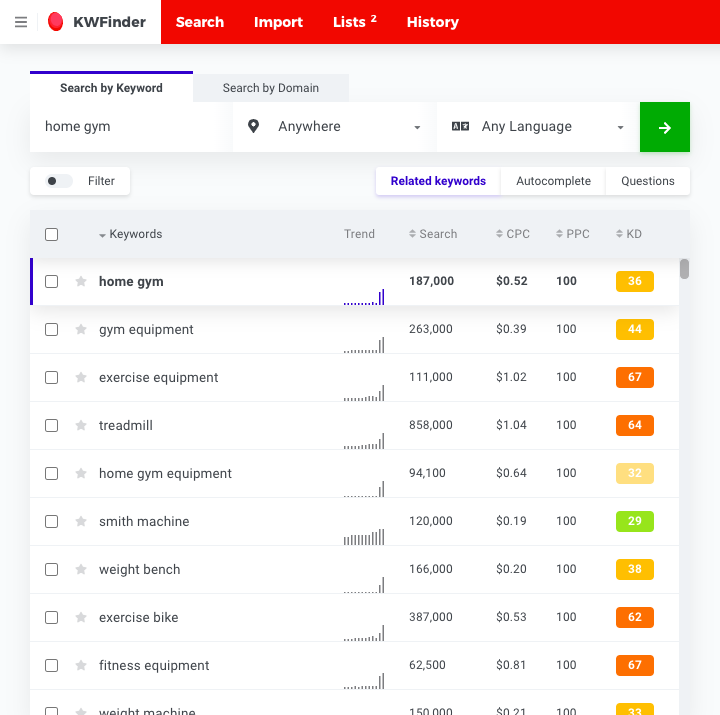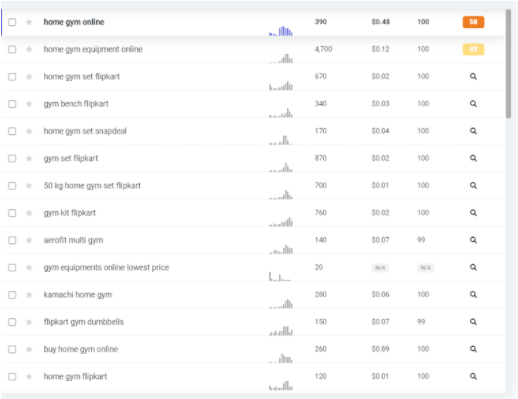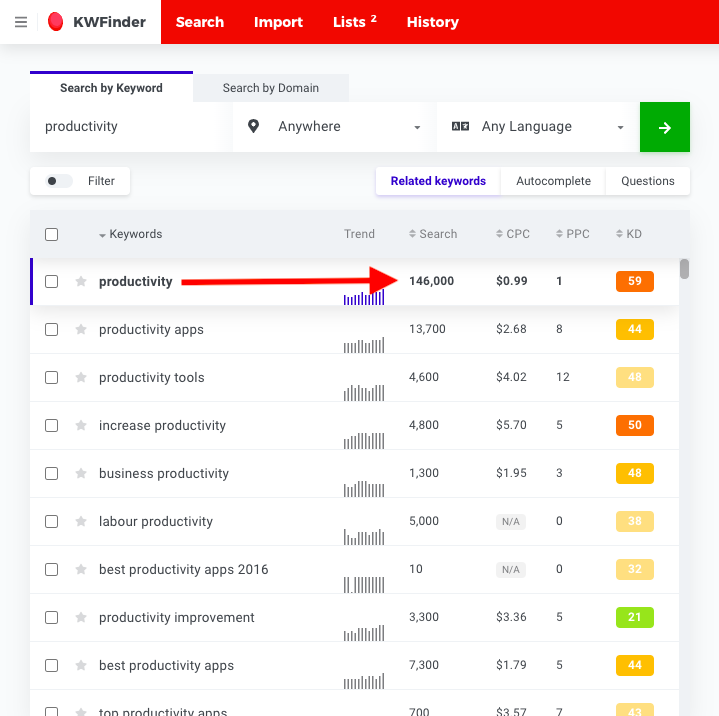You’re about to learn exactly how to find the best SEO keywords for three specific business scenarios.
- Affiliate Marketing / Ecommerce Business
- Coaching or Consulting Services
- Membership Programs or Digital Products
This is going to be the last keyword researching blog post you’ll ever need to read.
Why?
Because when you learn how to find low competition keywords, you know the SEO ‘magic sauce’ to get more traffic on Google, fast.
Let’s dive in.
Affiliate Marketing / Ecommerce Store
Let’s use a beauty product as an example in two difficult niches.
- Skin care
- Hair care
Here’s step one.
First, You’re Going to Need a Good Keyword Competition Checker
Use this one.
Use the free searches to try it out, but you should probably buy it.
Note: I’m an affiliate for this tool, so I get a kickback when you buy it. But that’s not why I recommend it.
I recommend it because I have used this tool every day for over 3 years. It’s awesome.
Trust me on this one. This is the ‘magic pick’ you need to mine your SEO gold.
Let’s start with an example using the term skin care to see how this works.
1. Skin Care Niche
To get started, type skin care into KWFinder.
You can see right away that skin care has 542,000 searches, costs $1.05 per click, and that the keyword difficulty is almost 70, which is ridiculously high—especially if you're just getting started.
In other words: High search volume (which is good), but also high competition (which is NOT good).
The next term, skin care products, has a difficulty score of 57.
To the untrained eye, it looks like there are no good keywords in this niche.
So what do you do?
Step 1 – Sort By Low KD
First, sort by keyword difficulty score.
You have to click KD twice.
Now you’re sorting to see low competition keywords first.
Step 2 – Recalculate Potential Keywords
Notice how the 19 and 25 green bubbles are a lighter shade of green?
This means they haven't updated those keyword difficulty scores in a while. So they may not be correct.
Click on the actual number, which will recalculate that keyword’s difficulty.
It’ll rerun the search and calculate the current keyword difficulty score.
The brighter green ones (16, 22, etc.) were searched relatively recently. So those numbers are accurate.
After you recalculate the keyword difficulty score for skin regimen, the 19 becomes a 20.
That's still money!
Here’s why.
Step 3 – How to Evaluate Keyword Values
If you're new and you have a brand new site, try to keep your competition numbers under 25 or 30.
If you go up much higher than that, you’ll be competing with big, established sites. And there’s no way you’ll beat their rank at this stage.
When you reach a Domain Authority in the 20s, you can start to look up to the 30s in difficulty scores.
To find your Domain Authority and Page Authority numbers, you can go to Moz to find out.
You can also find out by putting your website into the Site Profiler in Mangools (it’s another tool in the same suite as KWFinder).
In general...
Stick with the green ones – 20, 21, 22, etc.
Skin therapy shows up with a 6,200 search volume and a 16 keyword difficulty score—which is incredible! A keyword difficulty under 20 is extremely easy to rank for.
Best case scenario, you want keywords with:
- High search volume
- Low competition score
- High relevance to your audience
This gives you the best chance of ranking high on Google searches for those low competition keywords.
After you find a good keyword...
Step 4 – Evaluate Serp Overview
...You’re going to click on that keyword. This is going to show you what the Google results are displaying in the bottom-right corner.
Here’s what you’re looking for...
What to Look for in the Google Results
The strength of the websites: Look at DA (domain authority) and LPS (overall link profile strength).
Backlinks: The Links column shows you how many backlinks are pointing to this page. If a page in the top 10 search results has low backlinks, but still ranks well, that may mean that the content is really good.
Go to this content and study it: Learn how your competitors ranked so well without as many backlinks.
If you’re unfamiliar with knowing how to lay out your blog posts so they rank. You should check out my Learn SEO class. It’s a free class which shows how to prove to Google that you are the most SEO-friendly post for all your chosen keywords.
Here’s the next step.
Step 5 – Make a Keyword List
Once you find a page of keywords in KWFinder that contains relevant results, sort through them and start creating a list of keywords that would work well for posts on your site.
As you browse keywords, you’ll probably think...
“Skin therapy – that's my people!”
“Natural cosmetics – I can definitely do a post on that!”
“Anti-aging facial – perfect!”
To add them to a list, select them and use the Add to List function at the bottom of the window.
When you click Add to list, you get to name the list.
You also get the option to Export it.
Let’s move on and learn a few more tricks with another difficult niche:
Hair care.
2. Hair Care Niche
Hair care is the next example. But for this one, you’re going to learn a few little tricks that you didn't learn in the first example.
Sometimes when you search for keywords, you don’t get a colored KD rating. You get a white magnifying glass.
This means that the term hasn’t been analyzed in a while.
Look:
When you click on the magnifying glass, you get updated stats for that keyword.
But be careful!
You want to click on these sparingly, because you only get so many of them per day.
Only do this for keywords with sufficient search volume that would also work perfectly for your audience.
Relevance is of massive importance. Whenever you come across a keyword that may fit, ask yourself:
- Are these my people's questions?
- Is this a topic I can write about that fits in my niche?
- Are my best customers interested in this specific question?
For example: Let’s say that hair dye products is a super relevant keyword for your audience, but it has no listed KD score.
Click on the magnifying glass to search it.
Now it will show you all the stats, including the difficulty score.
If the search volume is high, the KD is low, and the keyword is relevant to your audience… boom!
You’ve struck gold!
Add it to your list.
What About Lower Search Volume Keywords?
As you are researching, you may come across a keyword like healthy hair conditioner.
It has 110 searches per month.
That may seem small and not worth it—but that isn’t necessarily true.
If you can crank out a blog post or video in an afternoon, and hit the first page of Google for that keyword—it would be well worth it!
That’s up to 110 more visitors per month than you would have gotten, and it becomes an asset for you for years to come.
Go ahead and optimize your blog posts and videos for SEO keywords that get 80, 100, 200, 300 searches, etc.
There's no competition for some of this low-hanging fruit.
Let’s move on to the next type of business and example.
Coaching or Consulting
For this example you’re going to see how to find easy keywords in the super competitive fitness and weight loss niche.
A virtual fitness coach for example, would want to connect with people Googling workout equipment for home use, or home gyms.
Everybody knows that home gyms are expensive, and that there are a few corporations that have some mega influence in the space... like the Bowflex Corporation.
So here’s how you navigate these coaching spaces where competition is already fierce.
Let’s do this with the keyword—home gym.
3. Fitness Niche
Here is what you want to do in this space.
You need to get onto the first page of Google. But as you can see, the keyword home gym is competitive. That’s not the way you want to go.
Filter keyword difficulties to find the least-competitive keywords.
The first thing you’ll see is home gym online. That’s a perfect fit for virtual fitness coaches, right?
But after clicking on the magnifying glass, you’ll see that it actually has a higher difficulty.
That’s not the one you want either.
Do more digging. You’ll find another keyword that works really well for your audience… like compact home gym. It has almost 4,700 searches per month, and a difficulty of 20.
This means that you could get somewhere around 2,000 clicks or so per month if you dominate the number one spot for this keyword.
That’s awesome! This is a keyword to add to the list.
You could rank well for this keyword with one amazing blog post.
Pretty easy!
But what about if you have a membership program or digital products to sell?
How can you draw people in?
Let’s take a look...
Membership Program or Digital Products
Next, you’re going to learn about finding low competition keywords for a membership program or digital product like a course or other information product.
Let’s look at how to search for keywords for someone selling an information product in the difficult productivity niche. The course being offered teaches people how to be more productive.
The three ideas you may jump to right away are:
- Time management
- Productivity management
- Productivity itself
Your target audience is searching for terms like how to be more productive.
Getting Started: Searching the Simplest Term
You start with the keyword productivity.
4. Productivity Niche
You start with this keyword instead of how to be more productive because the longer keyword may limit your keyword ideas too much.
You want to start with that generic shorter-phrase keyword, and then let the tool tell you what those longer tail keywords are.
Right away, you can see productivity is a hard keyword phrase to rank for – 146,000 searches, with a difficulty of 59. That’s too high for most sites.
So you sort the keywords by difficulty, and scroll down until you start hitting keywords that fit into your range and criteria.
There are a plethora of them: productivity improvement techniques is one example of a great one.
So you could write an awesome post titled the best productivity improvement techniques for [Current Year].
Not only could that potentially bring someone into your world as a membership member, but you could also place affiliate links inside that post and earn additional income on the side.
Team productivity, productivity blogs, productivity example – as you can see with keywords like these, the audience is literally looking for you. The difficulties are low. They are ripe for the picking.
Learn What People in Your Niche Are Interested in by Examining Keyword Searches
There is one more handy trick to learn while you’re working in your keyword finder tool.
To illustrate it, let’s say that you search for the term project management, which is quite saturated.
Take a look.
You probably don’t want to go for this keyword because it is so competitive (389,000 searches and a difficulty score of 61).
But it proves that there is a ton of interest in this area, and you could use that information to search for similar longer-tail keywords with lower difficulty scores to capture some of that traffic.
When you take the time to find these low difficulty, low competition keywords for SEO, everything about your content marketing is going to work better.
You're going to get more traffic more quickly, and you're going to enjoy the process more. It’s going to feel really good because you’ll start getting some fast wins under your belt.
Momentum builds on momentum.
If you want to know more about psychology and this keyword tool, check out this longer keyword research video where I go deep into the keyword research planning game.
Summary: How to Find Keywords for SEO
You have to get into the habit of doing SEO keyword research before creating any new blog posts or videos.
Make this your habit for every single piece of content you create from now on and you will begin to see better and more exciting results for your site and your business.
Here’s the low competition keyword strategy in a nutshell:
- Type in your keyword idea.
- Sort the list of related keywords by keyword difficulty, with the low competition keywords first.
- Then, update the difficulty score on any super relevant phrase or keyword that hasn’t been updated recently.
- Choose the most relevant easy to rank for keyword.
- Create awesome content that blows the competition out of the water.
This is the fast track to grow the reach of your website and make more money.
Even if you’re completely new, you can still win.
Remember:
- High volume
- Low competition
- Super relevant to your audience



